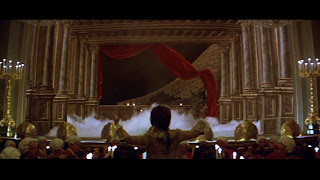Last night I watched Amadeus, a 1984 movie directed by Milos Forman and starring F. Murray Abraham, Tom Hulce, and Elizabeth Berridge. This movie is an historically inaccurate portrayal of the lives of Wolfgang Amadeus Mozart and Antonio Salieri, one of Mozart's contemporaries. It's really a very pretty movie and the score is entirely music composed by Mozart and Salieri (Salieri, while not as famous as Mozart, still has his work performed today, so he's not bad).
The story of Amadeus is told from the point of Salieri (F. Murray Abraham) as an old man in an insane asylum giving confession to a priest. He tells the story of how he grew up wanting the gift of music from God, and how he was over come with envy when God's gift was given to Mozart (Tom Hulce), a man who Salieri thought was crude and irresponsible. In response, Salieri turns his back to God and works to ruin Mozart as much as he can. Eventually, Salieri blames Mozart's death on himself, claiming that God did not want Salieri's mediocrity touching Mozart's, and thus God's, work.
When a guy tells his story while as an inmate at an insane asylum, it calls everything he says into question. I love unreliable narrators. They're so much more interesting than normal narrators. If I'm not questioning everything they're saying, it's not as much fun.
So, what I love in this movie is the breaking down of the barriers between fantasy and reality and how Salieri and Mozart's father start to blend together.
My dad has this lecture he does when he's trying to teach people writing. He explains to his pupils that there is a border surrounding the fictional world that's being created. This can be seen at the frame around a picture, the border around a chess board, or the curtains on the stage. The characters aren't aware of the world outside of that border and they can't exist outside of that border. In Amadeus, during the production of Don Giovanni, a demon literally tears down the curtain as the set falls to pieces.
This is a visual representation of what Salieri had been telling us-- that Mozart had written Don Pedro to be his father after his death, and that his father's spirit is still tormenting him. However, with the barrier broken down, this gives the ghost the freedom to leave the fantasy, allowing him to continue tormenting Mozart. Not only this, but throughout the scene we cut to Salieri watching from his box and the whole thing is crosscut with the elderly Salieri in the asylum. The breakdown happening on stage belongs not only to the fictional characters, but to Mozart and also to Salieri. The demons on stage haunt them both, and, like Don Giovanni, neither will turn from the paths they're on.
After this breakdown, Mozart gets darker. He doesn't laugh as often and his clothes start to become more somber and messier, he's taking less care of himself and is less happy. Previously, his home had been shown only in daylight and filled with natural light. After his father's death his home is more often shown at night and shown only in very dim candle light.
Salieri takes on a more active role in ruining Mozart. Before, he was simply influencing the emperor to keep Mozart from getting important appointments. Now that he's being possessed by Don Giovanni, he directly messes with Mozart by posing as his father and demanding that Mozart compose a funeral mass for him, claiming that it's for a man who deserved a grand mass, but got none. Salieri dresses in a costume that Mozart's father had been in earlier in the film
When Salieri wears the costume, though, he flips the mask around, speaking from the frowning mouth.
The two faces of the costume show the double identity of the person wearing the mask, how it could be either father or Salieri, but also the two faces of the men. Mozart's father was capable of either spoiling his son with affection or crushing him with disapproval. Salieri, when speaking directly to Mozart, would act as a friend to him, telling him that he would speak to the emperor on his behalf, and would attend all of Mozart's performances, while at the same time he was plotting to destroy Mozart.
Then there is the nature of sound within the movie. The entire soundtrack consists of music composed by either Mozart or Salieri. Sometimes it is clear that the music is being heard by all of the characters present, such as when we see operas being performed. At other times, the music is clearly extra-diegetic and not heard by anyone on screen. There are times, however, when Mozart or Salieri is composing or reading music that it is clear that the music the audience is hearing exists within the character's head, but not outside of it. In one of the final scenes, Mozart is dictating music to Salieri, who is copying it down. As they work, they hear the music inside of them, and we the audience hears it, too. When they stop to confirm a bit of music, the sound stops, just like it would in their minds. This brings us closer to them and they to each other than any other part of the film, as the music is what they are all about and their ultimate goals revolve around music. Being able to hear the music that they're hearing is major, as it is the truest way they have of expressing themselves.




No comments:
Post a Comment